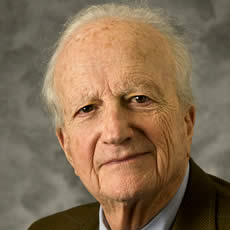Gary S. Becker
| Gary S. Becker |
|---|
| See also |
Gary S. Becker is a Nobel Prize Winner, one of the first economists, who reached into topics normally considered as belonging strictly to sociology, such as addictions, discrimination, racism, violence, family organization. Creator of the economic theory of crime.
Biography
Gary Stanley Becker was born 2 December 1930 in the town of Pottsville in Pennsylvania. At the age of about 5, he moved with his parents to New York. There he attended school. He began his studies at the University Princeton where he earned a BA, then continued his studies at the University of Chicago where he earned a PhD. He lectured at Columbia University and University of Chicago. In 1967 he received a John Bates Clark' medal, awarded by the American Association for young economists. In 1992 he was awarded the Nobel Prize in economics, and in 2007 was awarded Medal of Freedom by the President of the United States.
Basic views
- Becker believes that competition reduces discrimination. If discriminated against group represents a small fraction of the total, costs of discrimination are falling only on this group. If, however, it represents major part, the costs of discrimination fall both on the group and the rest. Therefore, he predicted economic necessity for the fall of apartheid in South Africa.
- Introduced the concept of investment in human capital and showed its economic consequences.
- He showed that committing a crime is a consequence of rational, thoughtful pros and cons, where the profit of the offense is greater than the expected penalty. According to Becker, there is a certain level of crime below which you can't get down.
- His research on family inspire him to put the conclusion that people come together in pairs, family, divorced, etc. through the analysis of potential gains and losses.
Discrimination is a long-lasting effect applied in relation to social groups, persons, organization etc., depending on different (worse) treatment despite being in similar (the same) situation. It can be the effect of using predominant position by one or the reluctance in regard of discriminated group. Discrimination also destroys social bonds present in the workplace.
Types of discrimination
Discrimination is a negative phenomenon because it leads to limitation of possibilities satisfying needs and full participation in society. Mostly the phenomenon of discrimination undergo social groups, which are dependent from others, differ significantly or are weaker. There are following types of discrimination:
- discrimination with regard on race (racism),
- discrimination with regard on age (ageism),
- discrimination with regard on sex (sexism),
- discrimination with regard on sexual orientation,
- discrimination with regard on confessed belief,
- discrimination with regard on being handicap.
Discrimination can be divided on:
- direct discrimination to deal with, when discriminatory working are public, intentional and organized guided,
- indirect discrimination which consequences are discriminating, despite that it was not their intention,
- the positive discrimination - the transmission of special privileges, right to social groups or to individuals so that their chances would level with a reason of the risk of discrimination,
- opposite discrimination - when activities are discriminating applied in relation to persons about predominant position.
Major works
- " The Economics of Discrimination", University of Chicago Press, Chicago, 1957
- "Human Capital: A Theoretical and Empirical Analysis, with Special Reference to Education", University of Chicago Press, Chicago, 1964
- Gary S. Becker and Gilbert Ghez, "The Allocation of Time and Goods Over the Life Cycle", Columbia University Press, New York, 1975
- "The Economic Approach to Human Behavior", University of Chicago Press, Chicago, 1976
- "A Treatise on the Family", Harvard University Press 1991
- "Accounting for Tastes", Harvard University Press, 1996
- Gary S. Becker and Kevin M. Murphy, "Social Economics: Market Behavior in a Social Environment", Harvard University Press, 2001
References
- Becker, G. S. (1965). A Theory of the Allocation of Time. The economic journal, 75(299), 493-517.
- Dipboye, R. L., & Colella, A. (Eds.). (2013). Discrimination at work: The psychological and organizational bases. Psychology Press.
- Frangsmyr T. (ed.), Les Prix Nobel. The Nobel Prizes 1992, Nobel Foundation, Stockholm, 1993
- Gary S. Becker University of Chicago website
